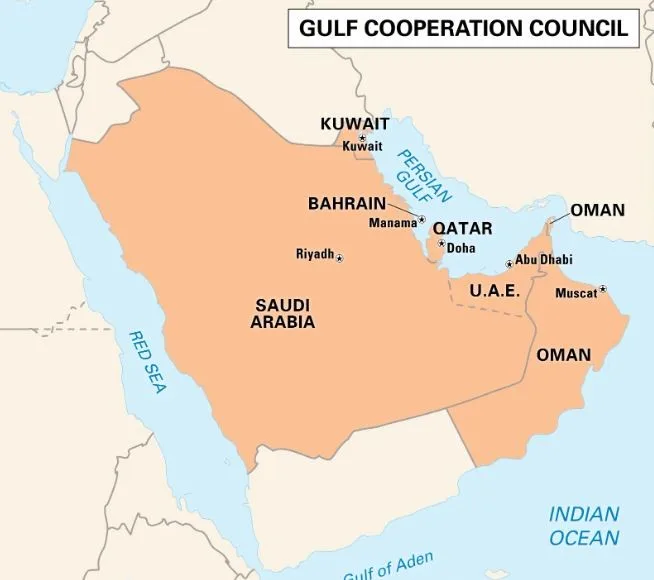Syllabus: GS2/IR
Context
- India and the Gulf Cooperation Council (GCC) held their inaugural Foreign Ministers meeting in Riyadh, where they adopted a Joint Action Plan for 2024-2028.
About
- This plan encompasses various collaborative activities in health, trade, agriculture, food security, transportation, energy, and culture.
- The plan allows for additional cooperative areas based on mutual agreement.
- EAM S. Jaishankar also held separate bilateral meetings with his counterparts from Qatar, Saudi Arabia, Oman, Kuwait and Bahrain on the margins of the India-GCC Ministerial meeting.
Gulf Region
- The Gulf Region typically refers to the countries surrounding the Persian Gulf in the Middle East.
- It includes nations like Saudi Arabia, Kuwait, Bahrain, Qatar, Oman, and the United Arab Emirates (UAE).
- This region is known for its vast oil reserves, which have significantly influenced global economics and politics.
Gulf Cooperation Council (GCC)
- It is a political and economic alliance of six Middle Eastern countries—Saudi Arabia, Kuwait, the United Arab Emirates, Qatar, Bahrain, and Oman.
- It was established in 1981.
- It is Headquartered at Riyadh, Saudi Arabia.
- It aims to achieve unity among its members based on their common objectives and their similar political and cultural identities, which are rooted in Arab and Islamic cultures.
- Presidency of the council rotates annually.

Importance of Gulf Region for India
- India’s priorities include attracting investments to increase economic growth, addressing regional security concerns (including in the Arabian Sea and the Gulf), and enhancing its regional presence and influence.
- Energy Security: The Gulf countries are major suppliers of crude oil and natural gas to India.
- India is highly dependent on Gulf oil for its energy needs, making the region crucial for India’s energy security.
- Remittance: Remittances from Indian expatriates working in the Gulf contribute significantly to India’s economy.
- Remittance is the non-commercial transfer of money by an individual to his/her home country or family.
- Security Cooperation: The Gulf region is strategically important for India’s security interests, given its location and influence in the Arabian Sea and Indian Ocean regions.
India’s Relations with GCC
- Strategic Partnership: GCC is a major trade and investment partner for India. While India has close economic and political ties with all countries, the strategic partnership exists with only Saudi Arabia, UAE, and Oman.
- Energy Security: The Gulf region fulfilled 55.3% of India’s total crude oil demand in 2022–23, compared to 63.9% in 2021–22.
- However, oil imports from Russia have been declining in 2023–24, and there are signs that India’s decreasing dependence on Gulf oil is already reversing.
- Trade and Investment: The GCC is India’s largest regional bloc trading partner. Trade with the GCC comprised 15.8 percent of India’s total trade in FY2022-23, compared to 11.6 percent of total trade with the European Union.
- The UAE has consistently been India’s principal trading partner within the Gulf and is India’s third-largest trading partner overall, with Saudi Arabia in fourth place.
- India also has a significant trade deficit with the GCC which is driven by India’s dependence on GCC countries for oil and gas imports.
- India’s regional geo-economic focus has driven it to engage with the I2U2 grouping and to join the India–Middle East–Europe Economic Corridor (IMEC).
- The two sides signed an inter-governmental framework agreement on IMEC. However, both initiatives risk being delayed by the Hamas–Israel war.
- Defence Relations: India’s defense engagements with these countries are gaining significant momentum.
- The Indian Navy established bilateral exercises with the UAE in 2018, with Qatar in 2019, and with Bahrain and Saudi Arabia in 2021.
- The Indian Army held its first exercises with the UAE and Saudi Arabia in 2024.
- The UAE is becoming India’s key regional defence partner; the UAE and Oman are the only regional countries with which India holds army, air force and navy exercises.
- India and the UAE have started trilateral military cooperation with France, holding a maritime exercise in 2023 and an air-force exercise in 2024.
Challenges Ahead
- The outbreak of the Hamas–Israel war and shipping attacks in the Red Sea directly impact India’s energy security and economic growth.
- Yet India remains reluctant to take an active role in the complex politics of the Middle East and is back to its long-standing balancing act between the Gulf, Iran and Israel. This could become more difficult if the war escalates further.
- The war has also impacted the I2U2 minilateral group, through the continued postponement of a senior-officials meeting since 2023.
- India has called for economic initiatives such as I2U2 and IMEC to progress despite the conflict.
- Other challenges include finalising the India–GCC Free Trade Agreement (FTA), which was initially delayed due to a change in the GCC’s chief trade negotiator.
- The key issue will be reaching an agreement that satisfies all GCC states.
- Additionally, India must manage diplomatic relations carefully following Islamophobic comments made by Indian officials in 2022.
- Any Islamophobic rhetoric from Indian nationals stands in contrast to the growing government-to-government display of religious tolerance between India and the Gulf.
Way Forward
- Growing security challenges are sharpening the need for India to become a key ‘strategic partner’ of the Gulf states and to enlarge its regional presence and influence.
- Increased strategic convergence spanning political, economic and security interests has resulted in a new framework for India–Gulf relations, which, if successfully maintained, will enhance trust levels and enable cooperation to become more ambitious in scope.
Source: ET
Previous article
News In Short-11-09-2024
Next article
New Act for Public Health Crisis